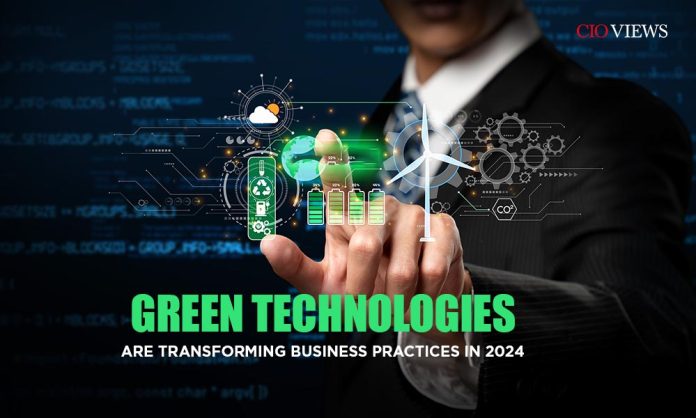In recent years, green technologies have rapidly evolved from niche innovations to mainstream solutions, becoming integral to business strategies worldwide. The drive for sustainability is no longer just a trend but a critical business imperative, as companies across industries recognize the need to mitigate environmental impact while maintaining profitability. In 2024, the transformation of business practices through green technologies is more pronounced than ever, offering companies an opportunity to reduce their carbon footprint, improve operational efficiency, and align with the values of increasingly eco-conscious consumers.
The Rise of Green Technologies: A Brief Overview
Green technologies encompass a wide range of innovations designed to promote sustainability and reduce environmental damage. These technologies span various sectors, including energy, transportation, waste management, and manufacturing. The rise of green technologies has been fueled by several factors, including regulatory pressures, consumer demand, and the economic benefits of sustainability. As governments worldwide implement stricter environmental regulations and as consumers increasingly prioritize sustainable products and services, businesses are compelled to adopt green technologies to stay competitive.
Key Drivers Behind the Adoption of Green Technologies
The adoption of green technologies in 2024 is driven by a combination of regulatory mandates, market demand, and corporate responsibility. Governments around the globe are enacting laws and incentives to encourage businesses to reduce their environmental impact. For instance, carbon pricing and emissions trading systems are compelling companies to invest in cleaner technologies. Additionally, the growing market for sustainable products is pushing businesses to innovate and offer eco-friendly alternatives to traditional goods and services.
Moreover, corporate social responsibility (CSR) has become a significant factor in shaping business practices. Companies are increasingly aware of the reputational and financial risks associated with unsustainable practices. As a result, many are committing to ambitious sustainability goals, such as achieving net-zero emissions or transitioning to 100% renewable energy.
Green Technologies in Energy: Powering the Future
One of the most significant areas where green technologies are making an impact is in energy production and consumption. The shift towards renewable energy sources, such as solar, wind, and hydroelectric power, is transforming the way businesses operate. In 2024, more companies are investing in on-site renewable energy generation, reducing their reliance on fossil fuels and lowering their carbon emissions.
Energy efficiency is another critical aspect of this transformation. Advances in energy-efficient technologies, such as LED lighting, smart thermostats, and energy management systems, allow businesses to reduce their energy consumption and operational costs. Additionally, the rise of energy storage solutions, like advanced batteries, is enabling businesses to store excess energy generated from renewable sources, ensuring a reliable and sustainable power supply.
Sustainable Transportation: Reducing Carbon Footprints
Transportation is a significant contributor to greenhouse gas emissions, making it a key area for the adoption of green technologies. In 2024, the push towards sustainable transportation is evident in the increasing use of electric vehicles (EVs), both in corporate fleets and personal transportation. Businesses are transitioning to EVs to reduce their carbon footprint and take advantage of the lower operational costs associated with electric vehicles.
Moreover, innovations in public transportation, such as electric buses and hydrogen-powered trains, are helping cities reduce their overall emissions. Companies involved in logistics and supply chain management are also adopting green transportation technologies, including hybrid trucks and optimized routing software, to minimize fuel consumption and emissions.
Green Technologies in Manufacturing: Towards a Circular Economy
The manufacturing sector is undergoing a significant transformation, driven by green technologies that promote resource efficiency and waste reduction. In 2024, the concept of the circular economy is gaining traction, with businesses focusing on designing products that can be reused, refurbished, or recycled at the end of their lifecycle.
Advanced manufacturing technologies, such as 3D printing and precision machining, are enabling companies to produce goods with minimal waste and lower energy consumption. Additionally, the use of sustainable materials, such as bioplastics and recycled metals, is becoming more common, helping businesses reduce their reliance on finite resources.
Waste Management Innovations: Turning Waste into Resources
Effective waste management is a crucial aspect of sustainable business practices, and green technologies are playing a pivotal role in this area. In 2024, businesses are increasingly adopting waste-to-energy technologies, which convert waste materials into usable energy, reducing the amount of waste sent to landfills and lowering greenhouse gas emissions.
Recycling technologies have also advanced, enabling the recovery of valuable materials from waste products. For example, innovations in e-waste recycling allow companies to extract precious metals and other valuable components from discarded electronics, reducing the need for new resource extraction.





